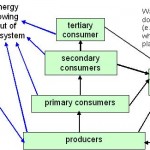Trophic Levels in simplest terms is levels in a food web created in ecosystems with producers comprise the lowest trophic level, and primary consumers comprise the next upper level, and so on. This is usually seen in reference to a food pyramid, but it is important to note that it more similar to a cycle, where decomposers, although they feed off the remnants of the highest … [Read more...]
Ecological Concept: Habitat Fragmentation
Habitat Fragmentation occurs when an ecosystem is disturbed causing large portions of the ecosystem to split up into smaller, segregated pieces that may develop independently if the disturbance is very significant. Habitat Fragmentation can occur as a result of both natural and human causes; the best examples being the Colorado River(on the right) and the creation of Suburbs … [Read more...]
Ecological Concepts: Competitive Exclusion Principle
Competitive exclusion principle states that two species that attempt to occupy the same niche in an ecosystem will be in competition, leading one population to either go extinct or adapt to fill a different niche. This principle is the basis for many experiments in ecology. This theory is not so much useful in predicting the future as it is in explaining the past. It is hard … [Read more...]
Distribution Patterns
Distribution patterns of organisms are spatial relationships of a population in its habitat. Basically, the question being asked is how the species is organized and how do they move? There are three general categories, random, clumped, and uniform. The scale of distribution patterns is also important to consider. Migratory bird such as ducks have changing distribution … [Read more...]
Ecological Concepts: Ecological Efficiency
Ecological efficiency is the amount of energy that is transferred from one trophic level to the next. This follows the 10% rule, which states that roughly 10% of the energy at one level will be available to be used by the next level. For example, on the pyramid below, producers are consumed by primary consumers. The consumers eat these producers, but only about 10% of … [Read more...]




